The Pillars of Benevolence: Waqf's Enduring Significance in Islam
Waqf is one of the meritorious acts and formidable symbols of Islam. It is an inextinguishable spring of reward for a Muslim. It has both spiritual and material benefits. It continues to create hope for students, researchers, patients, desperate widows, organisations, social services, religious institutions, educational entities, etc. An evident example of Islam’s concern for sustainable development is endowment because sustainability is the inherent and integral characteristic of waqf.
Waqf has its soulful role in the Islamic revival from the period of the Prophet Muhammad (ﷺ), the Companions, the Followers, Umayyad and Abbasid dynasties until the period of the Ottoman Caliphate. It still continues with its services at various levels in different parts of the world. Muslims are obliged to extend the hand of help to needy people as a human duty to their fellow human. The companions of the Prophet such as Abu Bakar, ʿUmar, ʿUthman, ʿAli, ʿĀisha, Fatimah, ʿAmr bin ʿĀs, Jabir, are some examples who made endowment. Muslims made endowments of the masjid, wells, bridges, hotels, rest houses, madrassah, universities, medicines, and trees. In addition, Muslims, in the realisation of duties towards other creatures, initiated waqf for animals and birds, for example.
Waqf has a huge role to play in a humanitarian cause and social solidarity by taking care to translate the concept of leaving no-one-behind. Waqf can be used as a funding source for several social welfares, healthcare, educational, humanitarian activities, and voluntary services, subject to the conditions spelt out by the endower. In addition, it can be used for facing calamities and encountering epidemics and tribulations.
Waqf is no longer a subsidiary chapter in Islamic juristic literature. Instead, it has outgrown to become an independent Islamic institution. Its profound impacts in several fields being a repository of sustenance and survival for many generations. From the definitions of waqf by the scholars of various madhāhib, we can retrieve specific facts:
- In waqf, the ownership is transferred to Allah (ﷻ), and its benefits are open to the people. Hence, its ownership cannot be moved to anyone else, and its benefit is long-lasting.
- It has an irreversible nature.
- It can be for self, family or others.
- In waqf, the property is protected, and its usufruct is dedicated to designated beneficiaries.
- The feature of waqf is perpetuity.
Ibn Ashur enumerated the goals of donations and charity[i], including waqf as:
- To increase the number of endowments and to promote people for charity.
- Plantation of generous behaviour and helping others for the sake of Allah (ﷻ) in the heart of believers.
- Flexibility in making donations by allowing various conditions in its implementation from the side of the endower.
In addition, the net benefits of waqf can be encapsulated as follows:
- cooperation (Taʿāwun)
- Solidarity (Takāful)
- Interdependence (Tarābuṭ)
- Sociability (Ilfah)
- Brotherhood (Ukhuwwah)
- Protection of wealth (Hifẓ al-māl)
- Investment for both worlds
Shāh Walīullāh Dehlawī explained the benefits of Waqf. The waqf was not known to the people before Islam, and the Prophet (ﷺ) introduced it to them because it includes features which are not present in other forms of charities and donations. Maybe some people spend a good amount of wealth to help people. However, once that wealth is used, the same people may be in a needy position once again. In addition, another group of needy people will emerge who might be deprived of any help. To combat this situation, the best and most effective way is the endowment, in which the property, source of help, is protected and maintained whereas its fruits, benefits and usufruct are kept open for the beneficiaries.[ii]
Waqf plays its role impacts both worlds. It becomes an investment for the endower for the next world as a source of infinite reward, giving him a sense of satisfaction and social solidarity in this world. For the beneficiary, the endowment helps meet this world’s needs and thus for working for the hereafter. The Islamic worldview is based on cultivating success in both worlds, as portrayed in the following Quranic verses: (1) {Our Rabb! Give us the good life, both in this world and in the Hereafter and save us from the torment of the fire} (al-Baqarah: 201). (2) {Rather seek, using what Allah has given you, to attain the abode of the hereafter while not neglecting your share in this world. Be good to others as Allah has been good to you} (al-Qasas: 77).
In Islam, types of obedience are classified into two:
- Beneficial for its does in the hereafter like prayer, fasting, etc.
- Beneficial for its doer (donor) in the hereafter and for the receiver in this world like hadiyyah, waqf, etc.[iii]
Ibn ʿAbd al-Salām further explained the Sharīʿah obligations are of two types one its reason and wisdom are intelligible for people (maʿqūl al-maʿna) and the other which has meaning and wisdom are known only to Allah (taʿabbudiyy).[iv] Ibn Rushd coined the terms maṣlaḥī and ʿibādi for the above categories respectively. maʿqūl al-maʿna means its benefit (maṣlaḥah) is understandable for people.
Waqf is crucial in the preservation and promotion of the lofty goals of ḍarūriyyāt, for example. The first waqf in Islam is the masjid which has a tremendous role in hifẓ al-dīn. Endowments help meet people’s basic and physical needs such as food, income and home, which becomes hifẓ al-nafs. Waqf is used for education, research comes under the preservation of intellect (hifẓ al-ʿaql) where in addition waqf for the family will help in the preservation of lineage (hifẓ al-nasl). Obviously, maintaining the property and spreading wings of help ensures one form of hifẓ al-māl.
The role of waqf in preserving and promoting the five essentials in maqāṣid can be seen in the table below[v]:
|
No |
Five essentials in Maqāṣid |
Waqf funds can be used for the purposes mentioned below: |
|
1 |
Hifẓ al-dīn (protection of religion) |
1. Establishment of Islamic institutions. 2. Facilitation of religious practices. 3. Opportunity for Islamic education. 4. Funding for students, teachers, imām, mu’addin, etc. 5. Support for Da’wah activities. |
|
2 |
Hifẓ al-Nafs (Protection of life) |
6. necessities for leading a healthy life, such as food, home, healthcare, etc. |
|
3 |
Hifẓ al-Nasl (Protection of the family) |
7. Help the wedding of low-income families 8. Help pregnant women from low-income families. 9. Support for the expenses of child-delivery and post-delivery needs. |
|
4 |
Hifẓ al-Aql (Protection of mind) |
10. Financial support for students, libraries, and educational institutions. 11. Support for research and intellectual activities, 12. Rehabilitation and care for addiction |
|
5 |
Hifẓ al-Maal (Protection of properties) |
13. Plantation, agriculture and gardening. 14. Investments. 15. Use the money to help the needy create jobs and livelihood. 16. Development, social security. 17. Financial stability, wealth distribution, economic justice, altruism (īthār). |
Table one: Role of Waqf in the preservation and promotion of five essentials of Maqāṣid.
(This article is part of a research work which was originally published on AWQAF Journal, (44). pp. 14-52. ISSN 1609-4662, published from Kuwait).
Endnotes
[i] Ibn ʿĀshūr, Muḥammad al-Ṭāhir, Maqāṣid al-Sharīʿah al-Islāmiyyah(Tunisia: Dār Saḥnūn, 2014), p. 488-492.
[ii] Shāh Walīullāh al-Dehlawī, Ḥujjat Allāh al-Bālighah (Beirut: Dār Iḥyā’ al-ʿUlūm. 1992), vol 2, p 310.
[iii] Al-ʿIzz Ibn ʿabd al-Salām, Qawāʿid al-Aḥkām fī Maṣāliḥ al-Anām, (Beirut: Dār al-Jīl. 1980), p, 18.
[iv] Ibid, 19.
[v] This table is retrieved from Muhsin, Sayyed Mohamed (2022) Road towards a Maqāṣidic Governance of waqf in Kerala: a preliminary analysis. AWQAF, 22 (42). pp. 38-39.
About the author
Sayyed Mohamed Muhsin, PhD is Assistant Professor of Islamic jurisprudence at the International Islamic University Malaysia (IIUM), Kuala Lumpur. He also serves as Editor-in-Chief of Islamonweb-English (https://en.islamonweb.net/)
Disclaimer
The views expressed in this article are the author’s own and do not necessarily mirror Islamonweb’s editorial stance.

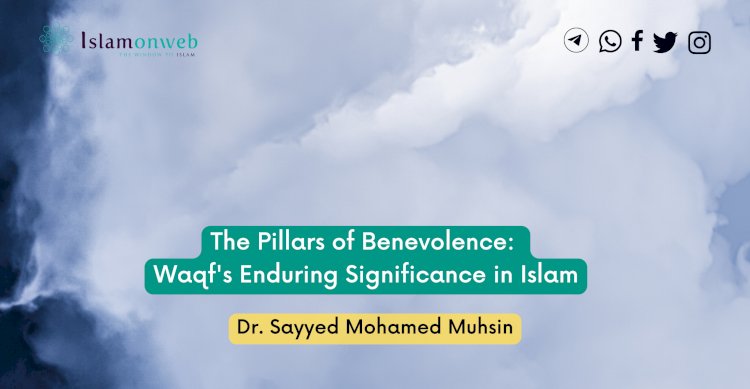


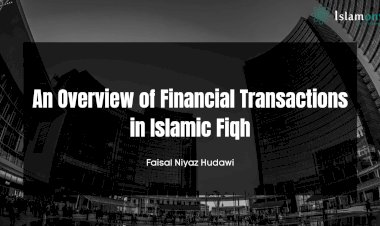

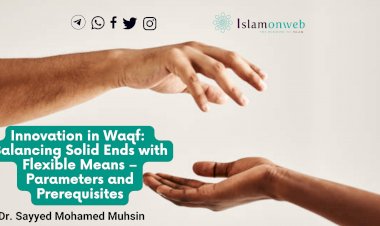

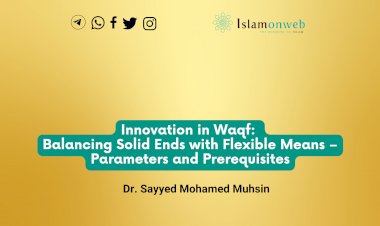
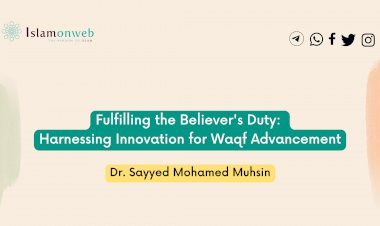














Leave A Comment